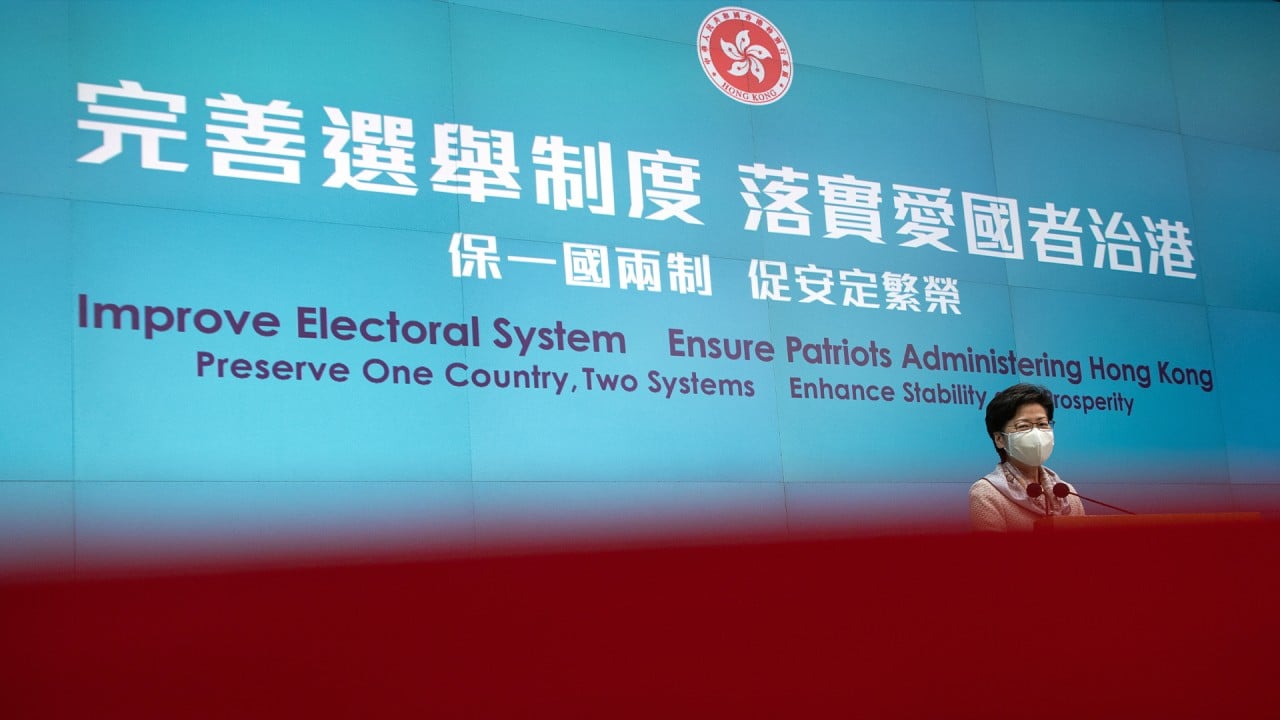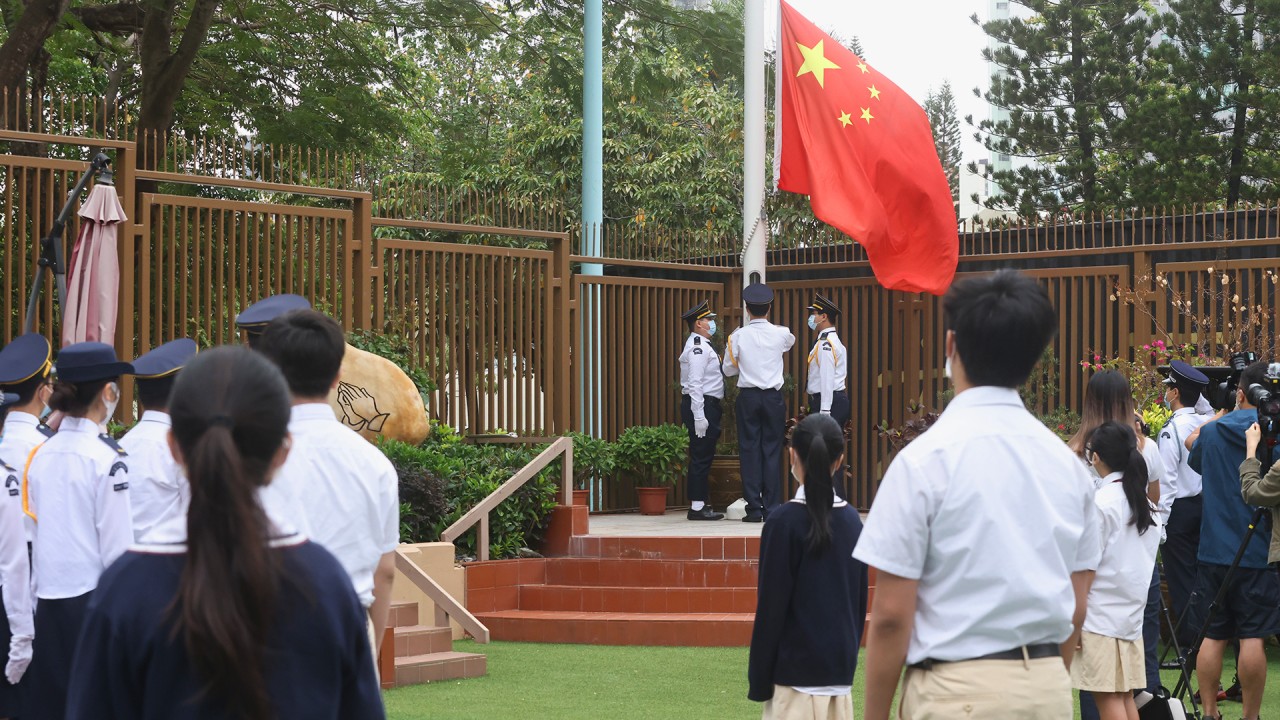
Hong Kong’s national security law: ‘fake news’, protest-group probe and elections overhaul
- The Post looks at the latest developments following last summer’s introduction in Hong Kong of the Beijing-imposed legislation
- Electoral reforms dominate city politics, while bail hearings of 47 opposition members accused of subversion, fresh Washington sanctions also feature highly
Ending months of speculation, Beijing finally unveiled concrete details in March for its overhaul of Hong Kong’s electoral system, with the central principle that only “patriots” can rule the city effectively barring most pan-democrats from seeking public office.
Hong Kong government unveils national security law details
Continuing a series of Post reports marking the milestones since the Beijing-imposed national security law was introduced in Hong Kong, here are the highlights from March and April.
Seismic changes unveiled for Hong Kong’s electoral system
The tougher-than-expected blueprint empowers the Beijing-controlled and newly expanded Election Committee – originally tasked only with picking the city’s leader – to also nominate lawmakers for the Legislative Council and field 40 representatives of its own to the legislature, which itself grows from 70 to 90 members.
It slashes the number of directly elected seats in geographical constituencies from 35 to 20, with the remaining 30 seats taken up by trade-based functional constituencies.
A new vetting committee is also created to decide on the eligibility of all candidates in key elections, with the help of the national security police and the national security committee chaired by Chief Executive Carrie Lam Cheng Yuet-ngor.

02:34
China’s top legislative body passes sweeping Hong Kong electoral reforms
While authorities have argued the overhaul will ensure the long-term stability and prosperity of Hong Kong, human rights watchers, opposition politicians and foreign countries have denounced the changes as retrogressive and say they will effectively wipe out the city’s dissenting voices.
When implementing the overhaul, the Hong Kong government proposes to make it a criminal offence to encourage voter boycotts or the spoiling of ballot papers in protest against the reforms.
In the cross hairs: Bar Association chief
Paul Harris, the new chairman of Hong Kong’s Bar Association, has remained the target of Beijing and its mouthpieces over the past two months, after previously saying he would explore the possibility of amending the national security law, which bans acts of subversion, secession, terrorism and collusion with foreign forces.
The latest attack came on April 25 from Beijing’s liaison office, which denounced him as an “anti-China politician” whose continuing tenure would make a mockery of the legal body, even plunging it into an “abyss”.
The office was targeting Harris’ recent defence of the right to peaceful protest after 10 people, including newspaper mogul Jimmy Lai Chee-ying, were convicted for their roles in illegal assemblies during the 2019 anti-government unrest.

The stern warning generated concern among senior counsels there was going to be a “total annihilation” of the Bar Association.
But backed by most of his council members, Harris has pledged to stay on and ride out the pressure.
Mass protests organiser under investigation
The force has given the prominent civil rights group one week to provide information relating to its funding and expenses, as well as an explanation for not registering with the government as required under the Societies Ordinance.
Police probe likely to prove fatal for Hong Kong civil rights group, analysts say
They have also demanded answers over its participation last December in a joint declaration to the United Nations, a move which pro-establishment figures said might have violated the national security law.
47 charged with subversion: most denied bail, some quit politics
The prosecution called the unofficial poll a “massive and well-organised scheme” aimed at paralysing the government and toppling the city’s leader by winning a controlling majority in the legislature.

05:11
Hong Kong schools mark first National Security Education Day under security law imposed by Beijing
Four activists – ex-lawmakers Alvin Yeung Ngok-kiu, Kwok Ka-ki and Jeremy Tam Man-ho, alongside district councillor Lee Yue-shun – resigned from the Civic Party during the lengthy proceedings, a move seen by analysts as an attempt to prove to the court they were quitting politics for good.
Several district councillors, including NeoDemocrats’ Roy Tam Hoi-pong and Gary Fan Kwok-wai, as well as Democrat Lam Cheuk-ting, also resigned from their roles, citing the difficulties in serving constituents while in custody.
Backlash after National Security Education Day
The day was marked with citywide events ranging from Chinese military-style marches and anti-terrorism drills to school promotional activities for children and weapons displays for students.
A picture from a police open day, featuring a group of children playing with toy guns on a mocked-up railway carriage, was published on Apple Daily’s front page, sparking a chorus of condemnation from authorities against the title founded by Lai.

His remarks drew severe criticism from press organisations, which expressed concern that authorities could use the proposed law to crack down on dissidents.
Disband for safety’s sake: ex-Civic Party members
The four ex-members of the opposition Civic Party facing charges under the national security law issued an appeal in April calling for the group founded in 2006 to disband.
The party had “already completed its historical mission” and dissolving it would help protect their ex-colleagues’ safety, the quartet said.
Despite the open letter, party chairman Alan Leong Kah-kit said that following internal discussions members had decided not to disband and instead make adjustments to its operations.
Also in April, ex-lawmaker Dennis Kwok confirmed he had moved with his family to Canada, where he was born. Kwok said he planned to regain citizenship there, while also announcing his decision to quit the Civic Party.
Hong Kong fugitives return from Shenzhen detention
The group, who were trying to flee prosecutions relating to the 2019 anti-government protests, were captured by the Chinese coastguard during their attempt to reach Taiwan.
On their return to Hong Kong, they were all remanded in local custody.
Eight fugitives sent back to Hong Kong, lawyer hits out at ‘secretive’ police
Among them was Andy Li, who was charged with collusion with foreign forces under the national security law.
When Li later appeared in court on April 9 amid extraordinary security, a lawyer unknown to his family claimed to represent him and said through a statement that he was “instructed through a private firm of solicitors”.
More sanctions from Washington
New rounds of United States sanctions were in mid-March slapped on Chinese officials in retaliation for Beijing’s drastic overhaul of Hong Kong’s electoral system.
It targeted 24 Beijing and city officials deemed to have “reduced Hong Kong’s high degree of autonomy”.
Those sanctioned included Tam Yiu-chung, the city’s sole delegate to the National People’s Congress Standing Committee, and Wang Chen, vice-chairman of the NPC Standing Committee, who spearheaded the electoral overhaul.


